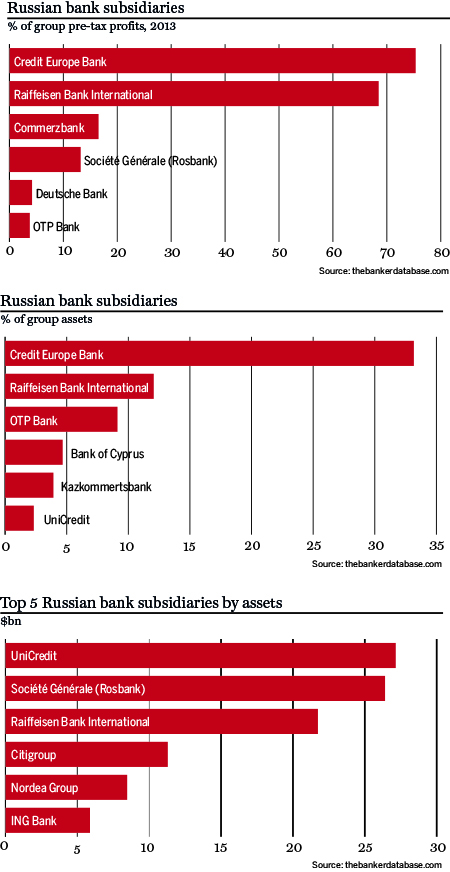Russia has been a key profit driver for several Western European banks and the slide in the rouble will have a significant impact.
The Central Bank of Russia suspended fair value accounting and some provisioning requirements for doubtful loans at Russian banks in December 2014. This followed a precipitous slump in the Russian rouble and stock market resulting from financial sanctions imposed by the EU and US and the slide in oil prices in late 2014.
Foreign banks, however, will most likely continue with their usual accounting and provisioning practices, as required by their home supervisors. This means their Russian subsidiaries are likely to take the full force of the exchange rate sell-off and financial distress among borrowers, especially those who were borrowing foreign currency unhedged. The sharp rise in rouble interest rates – by 11.5 percentage points during 2014, including 6.5 points in one move in December – will also hurt local currency borrowers with floating rate loans or imminent refinancing needs.
For the end of 2013 data used in The Banker's July 2014 Top 1000 World Banks ranking, we used an exchange rate of 32.73 roubles per dollar, derived from the International Monetary Fund annual statistics. At the time of writing, the rouble was worth about half this in dollar terms, moving erratically between 60 and 65 roubles per dollar.
We have excluded from consideration Home Credit, which has a parent company in the Netherlands. The parent is largely a holding vehicle that does not offer local banking services, so the Russian subsidiary unsurprisingly accounts for 85% of group assets and 73% of profits. Russia is also the dominant operation for Credit Europe Bank, although it does have some leasing businesses in Western Europe. Russia accounts for 33% of total assets for Credit Europe, but more than 75% of profits in 2013.
Credit Europe is a relatively small bank – only the ninth largest foreign subsidiary in Russia by assets – but the Russian operations of Austria’s Raiffeisen Bank International are more substantial. This is also a sizable banking group, with Russia accounting for just 12% of group assets. And yet, pre-tax profits in Russia were equivalent to 68% of the total group profits in 2013, as Raiffeisen subsidiaries in Romania and Hungary dragged on group performance. The impact of the rouble devaluation will be even more severe for Raiffeisen in 2014, because it also has a large subsidiary in Ukraine that will inevitably have suffered due to the conflict there.
One bank is missing from the table of large profit contributions – the largest foreign subsidiary in Russia. The Italian parent company of UniCredit suffered a $22bn loss in 2013, making it impossible to calculate a percentage contribution for the $911m profits generated in Russia. Part of the group loss in 2013 was attributed to one-off goodwill write-downs. But, with the Italian economy still weak and suffering high small business default rates, the decline in Russian revenues in 2014 is likely to substantially inhibit the bank’s efforts to return to profit.
Another bank that has little capacity to cope with a deep downturn in Russia is Bank of Cyprus, whose subsidiary Uniastrum accounts for 4.7% of group assets. Uniastrum was one of only two foreign subsidiaries (the other being the recently launched subsidiary of Turkey’s Isbank, which was in its start-up phase) to make a loss in 2013. Bank of Cyprus was still undertaking its recovery and recapitalisation process in 2014, and can ill afford a steeper loss in Russia. The bank is seeking buyers for Uniastrum, but current circumstances are hardly conducive for a quick sale.



